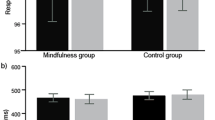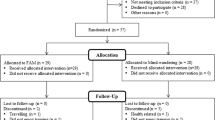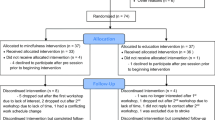Abstract
Objectives
A core process trained during mindfulness is inhibitory control. A decline in inhibitory control is thought to underlie age-related cognitive declines. Electroencephalographic event-related potentials (ERPs) index both the speed and allocation of attentional resources, making them useful in assessing cognition in ageing. While mindfulness has been shown to improve attentional control, studies examining ageing cohorts are lacking. Here, we examine ERP changes during an inhibitory control task in older adults to assess the ability of mindfulness to enhance cognition in ageing.
Methods
A longitudinal RCT was conducted to examine the effect of an 8-week mindfulness training (MT) intervention on the N2 and P3 ERP components during the Sustained Attention to Response Task (SART) in healthy older adults aged over 60 years (n = 48). An active control computer-based attention training (CT) program (n = 27) designed to activate similar attentional components to mindfulness was used to determine if outcomes resulted from attention training or mindfulness-specific factors.
Results
While both the MT and CT groups displayed improved SART performance following the interventions (as indexed by errors of commission and reaction time coefficient of variation), only the MT group showed significant reductions in frontal P3 latency during response inhibition.
Conclusions
The results suggest that mindfulness may enhance the speed and efficiency of attentional processes, thus providing protective benefits against age-related cognitive decline.



Similar content being viewed by others
References
Adam, K. C. S., Mance, I., Keisuke, F., & Vogel, E. K. (2015). The contribution of attentional lapses to individual differences in visual working memory capacity. Journal of Cognitive Neuroscience, 27(8), 1601–1616. https://doi.org/10.1162/jocn_a_00811.
Ambrosini, E., & Vallesi, A. (2016). Asymmetry in prefrontal resting-state EEG spectral power underlies individual differences in phasic and sustained cognitive control. NeuroImage, 124, 843–857. https://doi.org/10.1016/j.neuroimage.2015.09.035.
Anderer, P., Semlitsch, H. V., & Saletu, B. (1996). Multichannel auditory event-related brain potentials: Effects of normal aging on the scalp distribution of N1, P2, N2 and P300 latencies and amplitudes. Electroencephalography and Clinical Neurophysiology, 99(5), 458–472. https://doi.org/10.1016/S0013-4694(96)96518-9.
Andrés, P., Guerrini, C., Phillips, L. H., & Perfect, T. J. (2008). Differential effects of aging on executive and automatic inhibition. Developmental Neuropsychology, 33(2), 101–123. https://doi.org/10.1080/87565640701884212.
Bellgrove, M. A., Hester, R., & Garavan, H. (2004). The functional neuroanatomical correlates of response variability: evidence from a response inhibition task. Neuropsychologia, 42(14), 1910–1916. https://doi.org/10.1016/j.neuropsychologia.2004.05.007.
Delgado-Pastor, L. C., Perakakis, P., Subramanya, P., Telles, S., & Vila, J. (2013). Mindfulness (Vipassana) meditation: effects on P3b event-related potential and heart rate variability. International Journal of Psychophysiology, 90(2), 207–214. https://doi.org/10.1016/j.ijpsycho.2013.07.006.
Desbordes, G., Gard, T., Hoge, E. A., Hölzel, B. K., Kerr, C. E., Lazar, S. W., Olendzki, A., & Vago, D. R. (2015). Moving beyond mindfulness: defining equanimity as an outcome measure in meditation and contemplative research. Mindfulness, 6(2), 356–372. https://doi.org/10.1007/s12671-013-0269-8.
Donkers, F. C. L., & van Boxtel, G. J. M. (2004). The N2 in go/no-go tasks reflects conflict monitoring not response inhibition. Brain and Cognition, 56(2), 165–176. https://doi.org/10.1016/j.bandc.2004.04.005.
Eriksen, B. A., & Eriksen, C. W. (1974). Effects of noise letters upon the identification of a target letter in a nonsearch task. Perception & Psychophysics, 16(1), 143–149. https://doi.org/10.3758/bf03203267.
Gaeta, H., Friedman, D., & Hunt, G. (2003). Stimulus characteristics and task category dissociate the anterior and posterior aspects of the novelty P3. Psychophysiology, 40(2), 198–208. https://doi.org/10.1111/1469-8986.00022.
Gajewski, P., & Falkenstein, M. (2012). Training-induced improvement of response selection and error detection in aging assessed by task switching: effects of cognitive, physical, and relaxation training. Frontiers in Human Neuroscience, 6(130). https://doi.org/10.3389/fnhum.2012.00130.
Gajewski, P., Ferdinand, N. K., Kray, J., & Falkenstein, M. (2018). Understanding sources of adult age differences in task switching: evidence from behavioral and ERP studies. Neuroscience & Biobehavioral Reviews, 92, 255–275. https://doi.org/10.1016/j.neubiorev.2018.05.029.
Gratton, G., Coles, M. G. H., & Donchin, E. (1983). A new method for off-line removal of ocular artifact. Electroencephalography and Clinical Neurophysiology, 55(4), 468–484. https://doi.org/10.1016/0013-4694(83)90135-9.
Hedden, T., & Gabrieli, J. D. E. (2004). Insights into the ageing mind: a view from cognitive neuroscience. Nature Reviews Neuroscience, 5(2), 87–96. https://doi.org/10.1038/nrn1323.
Isbel, B., & Summers, M. J. (2017). Distinguishing the cognitive processes of mindfulness: developing a standardised mindfulness technique for use in longitudinal randomised control trials. Consciousness and Cognition, 52(Supplement C), 75–92. https://doi.org/10.1016/j.concog.2017.04.019.
Jha, A. P., Morrison, A. B., Dainer-Best, J., Parker, S., Rostrup, N., & Stanley, E. A. (2015). Minds “at attention”: mindfulness training curbs attentional lapses in military cohorts. PLoS One, 10(2), 1–19. https://doi.org/10.1371/journal.pone.0116889.
Kabat-Zinn, J. (1990). Full catastrophe living: using the wisdom of your mind to face stress, pain and illness. New York: Delta.
Kelly, M. E., Loughrey, D., Lawlor, B. A., Robertson, I. H., Walsh, C., & Brennan, S. (2014). The impact of cognitive training and mental stimulation on cognitive and everyday functioning of healthy older adults: a systematic review and meta-analysis. Ageing Research Reviews, 15, 28–43. https://doi.org/10.1016/j.arr.2014.02.004.
Kiesel, A., Steinhauser, M., Wendt, M., Falkenstein, M., Jost, K., Philipp, A. M., & Koch, I. (2010). Control and interference in task switching—a review. Psychological Bulletin, 136(5), 849–874. https://doi.org/10.1037/a0019842.
Luck, S. J., & Kappenman, E. S. (2011). The Oxford handbook of event-related potential components. New York: Oxford University Press.
MacLean, K. A., Ferrer, E., Aichele, S. R., Bridwell, D. A., Zanesco, A. P., Jacobs, T. L., et al. (2010). Intensive meditation training improves perceptual discrimination and sustained attention. Psychological Science, 21(6), 829–839. https://doi.org/10.1177/0956797610371339.
Malinowski, P., Moore, A. W., Mead, B. R., & Gruber, T. (2017). Mindful aging: the effects of regular brief mindfulness practice on electrophysiological markers of cognitive and affective processing in older adults. Mindfulness, 8(1), 78–94. https://doi.org/10.1007/s12671-015-0482-8.
Milner, B. (1971). Interhemispheric differences in the localization of psychological processes in man. British Medical Bulletin, 27(3), 272–277.
Miyake, A., & Friedman, N. P. (2012). The nature and organization of individual differences in executive functions: four general conclusions. Current Directions in Psychological Science, 21(1), 8–14. https://doi.org/10.1177/0963721411429458.
Mrazek, M. D., Smallwood, J., & Schooler, J. W. (2012). Mindfulness and mind-wandering: finding convergence through opposing constructs. Emotion, 12(3), 442. https://doi.org/10.1037/a0026678.
Pessoa, L. (2008). On the relationship between emotion and cognition. Nature Reviews Neuroscience, 9, 148–158. https://doi.org/10.1038/nrn2317.
Polich, J. (2007). Updating P300: an integrative theory of P3a and P3b. Clinical Neurophysiology, 118(10), 2128–2148. https://doi.org/10.1016/j.clinph.2007.04.019.
Posner, M. I., & Petersen, S. E. (1990). The attention system of the human brain. Annual Review of Neuroscience, 13(1), 25–42. https://doi.org/10.1146/annurev.ne.13.030190.000325.
Robertson, I. H., Manly, T., Andrade, J., Baddeley, B. T., & Yiend, J. (1997). ‘Oops!’: performance correlates of everyday attentional failures in traumatic brain injured and normal subjects. Neuropsychologia, 35(6), 747–758. https://doi.org/10.1016/S0028-3932(97)00015-8.
Sahdra, B. K., MacLean, K. A., Ferrer, E., Shaver, P. R., Rosenberg, E. L., Jacobs, T. L., … Saron, C. D. (2011). Enhanced response inhibition during intensive meditation training predicts improvements in self-reported adaptive socioemotional functioning. Emotion, 11(2), 299–312. doi:https://doi.org/10.1037/a0022764.
Sarter, M., Givens, B., & Bruno, J. P. (2001). The cognitive neuroscience of sustained attention: where top-down meets bottom-up. Brain Research Reviews, 35(2), 146–160. https://doi.org/10.1016/S0165-0173(01)00044-3.
Seli, P. (2016). The attention-lapse and motor decoupling accounts of SART performance are not mutually exclusive. Consciousness and Cognition, 41, 189–198. https://doi.org/10.1016/j.concog.2016.02.017.
Slagter, H. A., Lutz, A., Greischar, L. L., Francis, A. D., Nieuwenhuis, S., Davis, J. M., & Davidson, R. J. (2007). Mental training affects distribution of limited brain resources. PLoS Biology, 5(6), 1228–1235. https://doi.org/10.1371/journal.pbio.0050138.
Smallwood, J., & Schooler, J. W. (2015). The science of mind wandering: empirically navigating the stream of consciousness. Annual Review of Psychology, 66(1), 487–518. https://doi.org/10.1146/annurev-psych-010814-015331.
Staub, B., Doignon-Camus, N., Bacon, É., & Bonnefond, A. (2014). The effects of aging on sustained attention ability: an ERP study. Psychology and Aging, 29(3), 684. https://doi.org/10.1037/a0037067.
Stroop, J. R. (1935). Studies of interference in serial verbal reactions. Journal of Experimental Psychology, 18(6), 643–662. https://doi.org/10.1037/h0054651.
Sturm, W., & Willmes, K. (2001). On the functional neuroanatomy of intrinsic and phasic alertness. NeuroImage, 14(1), S76–S84. https://doi.org/10.1006/nimg.2001.0839.
Tang, Y. Y., Hölzel, B. K., & Posner, M. I. (2015). The neuroscience of mindfulness meditation. Nature Reviews Neuroscience, 16(4), 213–225. https://doi.org/10.1038/nrn3916.
Treisman, A. (1982). Perceptual grouping and attention in visual search for features and for objects. Journal of Experimental Psychology: Human Perception and Performance, 8(2), 194–214. https://doi.org/10.1037/0096-1523.8.2.194.
Treisman, A., & Gormican, S. (1988). Feature analysis in early vision: evidence from search asymmetries. Psychological Review, 95(1), 15–48. https://doi.org/10.1037/0033-295X.95.1.15.
Unsworth, N., Redick, T. S., Lakey, C. E., & Young, D. L. (2010). Lapses in sustained attention and their relation to executive control and fluid abilities: an individual differences investigation. Intelligence, 38(1), 111–122. https://doi.org/10.1016/j.intell.2009.08.002.
Van den Hurk, P. A. M., Giommi, F., Gielen, S. C., Speckens, A. E. M., & Barendregt, H. P. (2009). Greater efficiency in attentional processing related to mindfulness meditation. The Quarterly Journal of Experimental Psychology, 63(6), 1168–1180. https://doi.org/10.1080/17470210903249365.
van Veen, V., & Cameron, C. S. (2002). The timing of action-monitoring processes in the anterior cingulate cortex. Journal of Cognitive Neuroscience, 14(4), 593–602. https://doi.org/10.1162/08989290260045837.
Verleger, R., Jaśkowski, P., & Wascher, E. (2005). Evidence for an integrative role of P3b in linking reaction to perception. Journal of Psychophysiology, 19(3), 165–181. https://doi.org/10.1027/0269-8803.19.3.165.
Weeks, J. C., & Hasher, L. (2015). Aging and inhibition. In N. A. Pachana (Ed.), Encyclopedia of Geropsychology. Singapore: Springer.
Weissman, D. H., Roberts, K. C., Visscher, K. M., & Woldorff, M. G. (2006). The neural bases of momentary lapses in attention. Nature Neuroscience, 9, 971–978. https://doi.org/10.1038/nn1727.
West, R. (2004). The effects of aging on controlled attention and conflict processing in the stroop task. Journal of Cognitive Neuroscience, 16(1), 103–113. https://doi.org/10.1162/089892904322755593.
Zanesco, A. P., King, B. G., Maclean, K. A., & Saron, C. D. (2013). Executive control and felt concentrative engagement following intensive meditation training. Frontiers in Human Neuroscience, 7, 1–13. https://doi.org/10.3389/fnhum.2013.00566.
Zigmond, A. S., & Snaith, R. P. (1983). The hospital anxiety and depression scale. Acta Psychiatrica Scandinavica, 67(6), 361–370. https://doi.org/10.1111/j.1600-0447.1983.tb09716.x.
Funding
BI conducted this work with the support of the Judy Henzell Memorial Scholarship. MS reports personal fees from Eli Lily (Australia) Pty Ltd. and grants from Novotech Pty Ltd., outside the submitted work.
Author information
Authors and Affiliations
Contributions
BI designed and conducted the study, delivered the interventions, performed the data analysis, and wrote the paper. JL collaborated in the data analysis, writing, and editing of the final manuscript. DH collaborated in the data analysis, writing, and editing of the final manuscript. KS reviewed all ERP component data analysis and collaborated in editing the final manuscript. MS collaborated in the design, data analysis, writing, and editing of the final manuscript.
Corresponding author
Ethics declarations
Conflict of Interest
The authors declare no conflicts of interest.
Ethics Statement
All procedures were performed in accordance with the ethical standards of the University of the Sunshine Coast Human Research Ethics Committee (approval: HREC A-15-748), the Australian National Statement on Ethical Conduct in Human Research, and the Code of Ethics of the World Medical Association (Declaration of Helsinki). In accordance with the latter two ethical statements which proscribe the use of no-treatment or placebo controls when existing effective treatment conditions exist, an active control condition consisting of a program of cognitive training was used as a comparison condition to assess the benefits of mindfulness training.
Informed Consent
Informed consent was obtained from all individual participants included in the study.
Additional information
Publisher’s Note
Springer Nature remains neutral with regard to jurisdictional claims in published maps and institutional affiliations.
Electronic Supplementary Material
ESM1
(PDF 46 kb)
Rights and permissions
About this article
Cite this article
Isbel, B., Lagopoulos, J., Hermens, D. et al. Mindfulness Improves Attention Resource Allocation During Response Inhibition in Older Adults. Mindfulness 11, 1500–1510 (2020). https://doi.org/10.1007/s12671-020-01364-z
Published:
Issue Date:
DOI: https://doi.org/10.1007/s12671-020-01364-z




